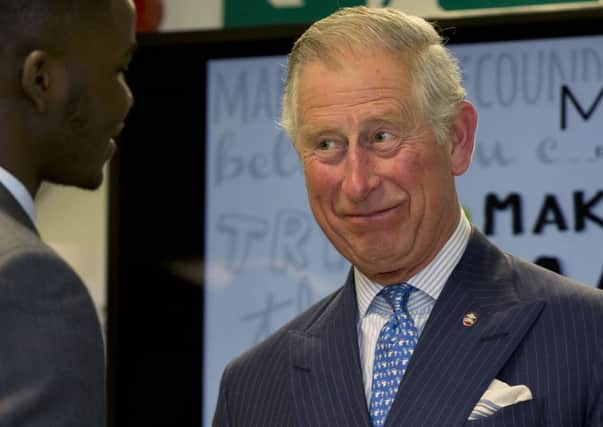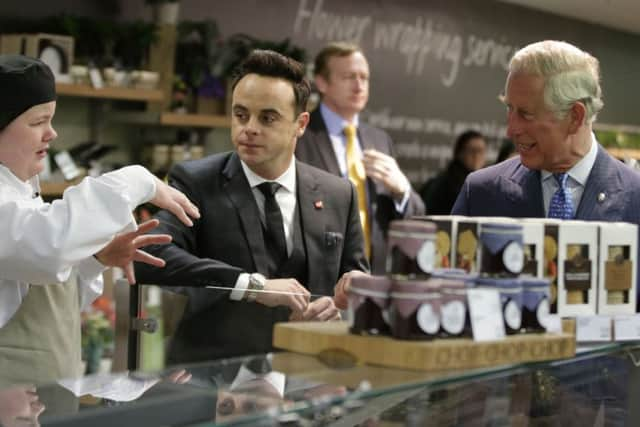Charles letters: Iraq troops lacked resources, says Prince


In one letter, dated September 8, 2004, Charles speaks of problems with deploying new Oxbow surveillance technology, which he describes as a “major advance”.
But he adds: “The aim of the Ministry of Defence and the Army Air Corps to deploy this equipment globally is, however, being frustrated by the poor performance of the existing Lynx aircraft in high temperatures.
Advertisement
Hide AdAdvertisement
Hide Ad

“Despite this, the procurement of new aircraft to replace the Lynx (helicopter) is subject to further delays and uncertainty due to the significant pressure on the Defence Budget.
“I fear this is just one more example of where our Armed Forces are being asked to do an extremely challenging job (particularly in Iraq) without the necessary resources.”
The letter to Mr Blair is one of 10 sent by the prince to ministers which have been released following a long legal battle.
A further 14 by ministers and three letters between private secretaries were also released following the long-running campaign by Guardian journalist Rob Evans to see the documents following a freedom of information request.
Advertisement
Hide AdAdvertisement
Hide AdAs the letters were released, Clarence House issued a statement defending the prince’s correspondence with ministers,saying: “The publication of private letters can only inhibit his ability to express the concerns and suggestions which have been put to him in the course of his travels and meetings.”
The statement also insists: “The Prince of Wales is raising issues of public concern, and trying to find practical ways to address the issues.”
The statement said Charles carries out more than 600 engagements a year which “gives him a unique perspective” and has led to him identifying issues that “he, or his charities, or his other connections, can help address”.
It went on: “Sometimes this leads him to communicate his experience or, indeed, his concerns or suggestions to ministers, from all Governments, of whatever party, either in meetings or in writing.
Advertisement
Hide AdAdvertisement
Hide Ad“Government ministers have often encouraged him to do so, and many have welcomed the Prince’s views and ideas on a range of subjects. There are examples of this in the correspondence that has been made public.”
In his response to the Lynx letter, Mr Blair replied on October 11 that year, saying that “limitations of the existing platform” were well known by the MOD, and the budget for the coming years included investment in helicopters.
He wrote: “While the Ministry of Defence clearly has to operate within finite resources, our planned investment in future helicopters will be substantial - £3 billion over the next ten years, and £6 billion over the coming two decades.
“Replacement of the Lynx and Gazelle reconnaissance and surveillance capabilities will be a priority for this programme which will seek to deliver a future fleet which is fully capable of deployment in all anticipated operational environments.”
Advertisement
Hide AdAdvertisement
Hide AdIn one note to Mr Blair, the prince asks the prime minister to put “pressure” on the Department for Environment, Food and Rural Affairs over the bureaucratic burdens facing farmers.
Charles wrote in the lengthy letter dated September 8 2004: “Suffice it to say that any pressure which you can bring to bear on D.E.F.R.A. through the Panel for Regulatory Accountability, which you told me you are chairing, would be much appreciated.
“Vigilance is essential to help officials resist returning to type!”
The letters show the Prince of Wales expressing concern about issues he has raised in public such as farming, the preservation and regeneration of historic buildings, the professional development of schoolteachers and the use of herbal medicine.
Advertisement
Hide AdAdvertisement
Hide AdClarence House said: “In all these cases the Prince of Wales is raising issues of public concern and trying to find practical ways to address the issues.”
There were no “black spider” letters among the batch released - so-called because of the black ink used by the prince in some correspondence and the underlining of words.
It is understood that the prince is “disappointed” that the confidentiality principle was not maintained.
But Guardian editor-in-chief Alan Rusbridger said: “We fought this case because we believed - and the most senior judges in the country agreed - that the royal family should operate to the same degrees of transparency as anyone else trying to make their influence felt in public life.
Advertisement
Hide AdAdvertisement
Hide Ad“The Attorney General, in trying to block the letters, said their contents could ‘seriously damage’ perceptions of the prince’s political neutrality.
“Whatever the rights and wrongs of that assessment, it is shocking that the Government wasted hundreds of thousands of pounds of public money trying to prevent their publication.
“Now, after 10 years, we are pleased to be able to share the contents of his correspondence and let people draw their own conclusions.”
Charles was at St James’s Palace in central London when the letters were released.
Advertisement
Hide AdAdvertisement
Hide AdHe spoke at the Prince’s Trust’s Our Young People Our Future conference, before joining a reception with supporters to mark 40 years of the Trust, in front of guests including the television presenters Ant and Dec, who are Trust ambassadors, and Channel 4 newsreader Jon Snow.
The prince made no mention of the letters during his speech.
Earlier, as he arrived at Marks and Spencer’s flagship store on London’s Oxford Street to highlight a work placement scheme between the retailer and his Prince’s Trust, one of his senior aides ripped the cover off Channel 4 News political correspondent Michael Crick’s microphone when he asked Charles if he was “worried” about the documents being made public.
Charles did not reply but said “very predictable” as he entered the store.
Advertisement
Hide AdAdvertisement
Hide AdCrick later said: “He didn’t seem too pleased that we asked.”
Among the correspondence were letters sent to Mr Blair and then-health secretary John Reid on the subject of herbal medicine.
In 2005 the Department of Health was considering regulation of herbal medicine and acupuncture, following a European directive.
Charles had a long-held belief that complementary approaches are an essential part of any healthcare system, as long as they are safely and effectively delivered, are based on evidence and are properly integrated with any conventional treatments, and he made a speech to the World Health Assembly on the theme.
Advertisement
Hide AdAdvertisement
Hide AdClarence House said that, along with many practitioners and patients, Charles was “keen to encourage the development of an appropriate regulatory regime with the dual purpose of preserving choice of practitioner and product, while also maximising patient safety”.
Mr Reid sent Charles a letter in February 2005 telling him that a consultation found there was “strong support” for statutory regulation of herbal medicine and acupuncture.
Charles also complained to Mr Blair about the Office of Fair Trading, writing: “Unfortunately, I am told that the Office of Fair Trading is becoming a serious obstacle to developing dairy co-operatives of the necessary size and influence.
“As I understand it, it sees the United Kingdom as ring-fenced with the Channel acting as a barrier to imports, which is, of course, ridiculous.”
Advertisement
Hide AdAdvertisement
Hide AdHe added that Mr Blair had said he would look at the matter and “see if there was anything which could be done to help the O.F.T to take a wider view”.
Mr Blair, in his letter of response dated October 11, 2004, reminds the Prince of the OFT’s independence.
“Of course, as you recognise, they are rightly an independent body and I couldn’t influence them even if I wanted to,” the then prime minister wrote.
Both Mr Blair and the heir to the throne signed their letters to one another “Yours ever”.
Advertisement
Hide AdAdvertisement
Hide AdIn another letter to Mr Blair, the Prince of Wales described opponents of a badger cull as “intellectually dishonest” and advocated culling to tackle tuberculosis in cattle.
Writing in February 2005, Charles criticised the “badger lobby” for not minding about the slaughter of cattle which contract the disease but objecting to the killing of badgers.
He urged Mr Blair to “look again at introducing a proper cull of badgers where it is necessary”, warning that the rising number of cases of TB in cattle was the most pressing and urgent problem facing the agricultural sector.
“I, for one, cannot understand how the ‘badger lobby’ seem to mind not at all about the slaughter of thousands of expensive cattle, and yet object to a managed cull of an over-population of badgers - to me, this is intellectually dishonest,” he wrote.
The then Labour government resisted pressure to launch a cull although David Cameron’s coalition government did go ahead with one on a limited basis in 2013.